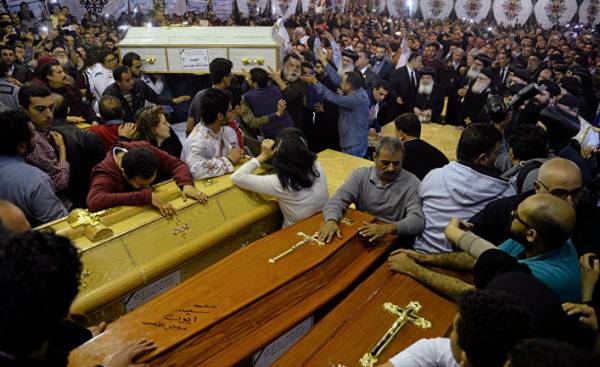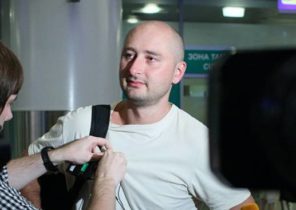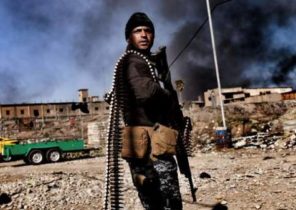
Before the Pope’s visit to Cairo in less than 20 days. Pope Francis expressed deep condolences to the Patriarch of the Coptic Church to Tawadros II and the nation of Egypt in connection with the attack in the Coptic churches in the cities of Alexandria and Tanta.
We quoted the news Agency of the Pope in the Vatican, which in the course of his sermon today said: “I pray for all the dead and wounded. Soul I, along with their families. May God turn the hearts of those who sow violence and terror, and also those who sell arms.”
However, the Pope made no statements about the fate of his visit to Egypt, scheduled for 28 and 29 April.
Whether repealed the Pope’s visit or pass according to the program is unknown, but, doubtless, this bloody terrorist attack cast a frightening shadow on the upcoming trip.
Question: can the bombings of churches on palm Sunday to affect the visit of Pope Francis to Egypt? Maybe…
However, experience suggests that, typically, terrorist attacks are aimed at undermining stability of the state and development of a sense of anxiety in people…
If Pope Francis changes his mind to visit Cairo, it will cause the West fears that Egypt is unsafe.
Local and foreign armed groups have always sought to take actions that have a psychological, political and social impact in order to shake the confidence of citizens in their own state and power, and then to strike at the stability of the state, to wreak havoc and spread an atmosphere of tension, uncertainty and insecurity.
The terrorist group followed the path that opened after the “Arab spring” and the fall of a number of influential States, such as Syria, Libya and Yemen under the influence of ISIS (banned in Russia — approx. ed.) headed by Abu Bakr al-Baghdadi and other armed groups. Political pressure of terrorists is not systematic, they use a variety of methods: suicide vests, bombs, armed attacks, chase with axes and knives to serious attacks on the government. They are taking revenge for the murder of the head or a member of an extremist organization, coolly making their extremist actions.
Many regional groups and terrorist cells, scattered in various parts of the globe, only sympathizes with ISIS, but does not belong to the organization. Their actions should influence society to undermine the confidence of the people to their governments. The terrorists are counting on the maximum possible number of victims, not to mention the fact that extremist groups want to impose their views “bullets and gunpowder”.
Thus, in particular, for LIH, whose official offices around the world, the most effective way to influence the government and the population is a strategy of surprise.
But the most effective way is no longer the most important in the strategy of ISIS, al Qaeda and other extremist groups. National and religious events remain important for different countries, especially those in whose territories there are pockets of overt or covert terrorism. These countries are an important target for terrorist attacks now.
The ISIS and their followers believe that the most serious damage can be applied to any government and society during the official celebrations. Such acts undermine the confidence of the people of the state and make them feel helpless in the face of danger, and also to doubt the ability of the authorities to protect them.
During national and religious holidays, and also during international events or receive foreign dignitaries degree of security in the country is at the highest level, and so when a terrorist group manages to commit a terrorist attack at this time, it allows the media to accuse the government of failing to provide security in their own country.
Thus, the state has become obsessed with security for major public events, which are “tasty morsel” for extremist groups, including terrorists from the “Islamic state”.
The problem for Egypt is that terrorist forces continue to be targeted at Copts during religious activities, be they Islamic or Christian.
Today there were explosions in the churches in the cities of Tanta and Alexandria on palm Sunday. More recently, similar explosions occurred at St Peter’s Church in celebration of the birthday of the prophet Muhammad.
Other painful acts committed in Egypt by terrorists, have been associated with the elimination of influential people, including the killing of former Prosecutor General Hisham Barakat at the end of June 2015. As well as a failed attempt of ISIS to take control of the settlement of Sheikh Zuveyd and declare it an Islamic Emirate in July 2015. These two incidents, according to the militants, was the first reminder of the basis of the “Islamic state”.
In addition, in August 2016, the former Grand mufti of Egypt, Ali Gomaa, was attacked, but this attempt was not successful. This attempt was the third reminder “Muslim Brothers” about yourself.
On the morning of may 8, 2016 the attack occurred in the town of Helwan, which claimed the lives of eight police officers. Responsibility for the incident claimed by the group “popular resistance” associated with banned in Egypt movement “Muslim brotherhood”. Indicates that the attack was timed to the 1,000 th day since the dispersal of the protests at the mosque rabaa al-Adau in Cairo.
Thus, a great responsibility lies on the shoulders of the security services of Egypt to the joyous event turned into a funeral.







